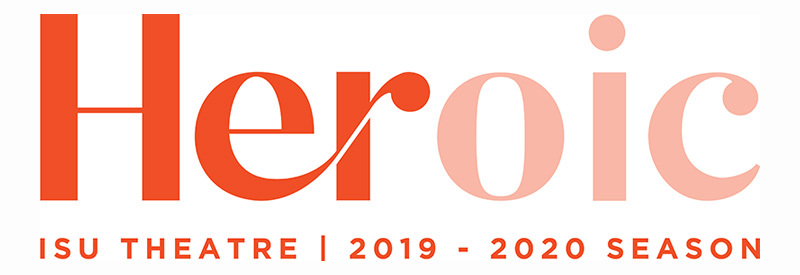Open classroom
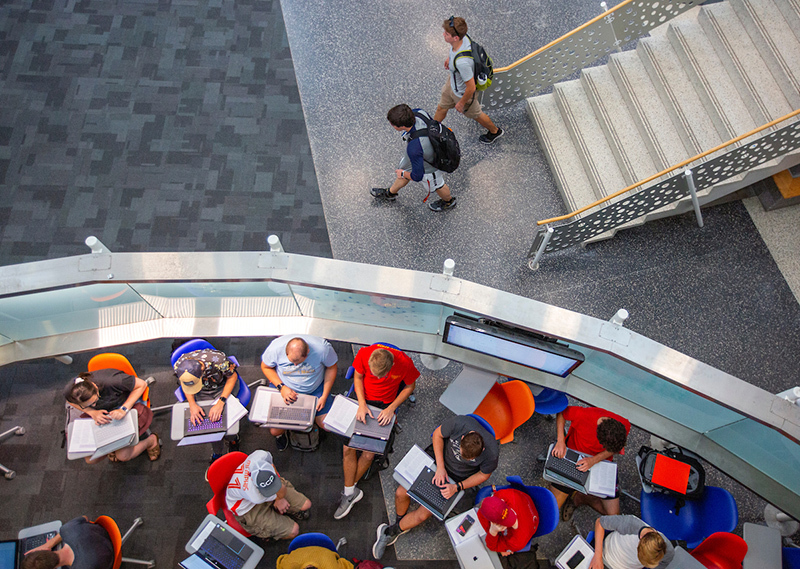
Photo by Christopher Gannon.
Students in Aerospace Engineering 160 work on their laptops Monday afternoon in the interactive open classroom on Howe Hall's lower level, oblivious to traffic on the other side of the screen. The course is an introduction to aerospace engineering and engineering design, with a focus on solving problems and learning how to present solutions.
Nusser to complete service as VPR next summer
Sarah Nusser has announced she will complete her service as Iowa State's vice president for research (VPR) at the end of the current fiscal year.
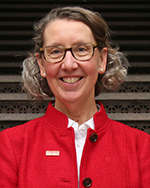
Sarah Nusser
Nusser, a professor of statistics, has served as VPR since February 2014, and earned reappointment earlier this year. During her tenure, she increased the university's external research funding, including a record $261 million in FY2019. She also launched the Grants Hub to assist researchers with large-scale proposals and new funding opportunities, and worked to diversify both governmental and nongovernmental funding.
"Serving as vice president for research has been immensely rewarding. I appreciate the tremendous ideas and energy put forth by our campus researchers, as well as the partnerships among our office, colleges and collaborating units to advance Iowa State's research mission," Nusser said. "I look forward to working with my successor to continue our momentum and achieve even greater results in the future."
Once her service as VPR is complete, Nusser plans to seek a fellowship in Washington, D.C., where she will continue to work on policy issues related to public access and transparency for academic research during the 2021 fiscal year.
"Sarah continues to do an outstanding job leading Iowa State's research programs," said senior vice president and provost Jonathan Wickert. "She is a tireless advocate for interdisciplinary research who has improved not only funding, but also the service offered to faculty and staff across the institution, and I am extremely thankful for her efforts."
National search
A national search for Nusser's successor will begin in the coming weeks. The provost's office is accepting nominations for the search committee, which will include students, faculty, staff and external stakeholders. Suggestions should be sent to Julie Johnston, jham@iastate.edu, by Friday, Oct. 4.
The committee will begin soliciting candidate nominations and applications later this fall, with a target of spring 2020 for on-campus finalist interviews. A search firm will assist the committee with its work.
Nusser joined the Iowa State faculty in 1992. She earned bachelor's and master's degrees in botany from the University of Wisconsin, Madison, and North Carolina State University, Raleigh, respectively, and master's and doctoral degrees in statistics from Iowa State.
Electric vehicle charging stations open for personal use during the day
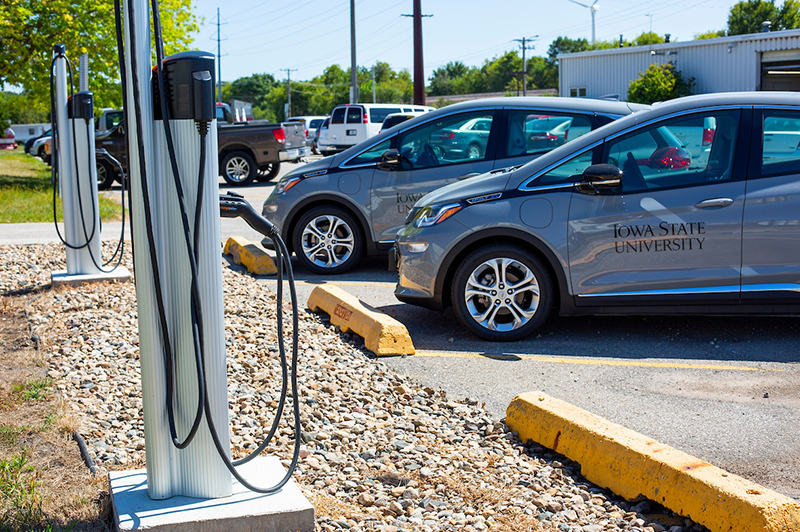
Electric possibilities: The two electric vehicle charging stations (left) and transportation services' Chevrolet Bolt rental options (right). Photo by Christopher Gannon.
Two electric vehicle charging stations, each equipped with two charging lines, were installed in transportation services' lot in the northeast corner of campus this summer. Employees who commute to work in electric vehicles are welcome to charge their vehicles during business hours (7 a.m.-4 p.m.). They'll use the smart device app ChargePoint (iPhone and Android) to pay for their charging time at the bargain rate of $1 per hour, Iowa State's standard parking meter rate.
Transportation services, which recently added two Chevrolet Bolt hatchback electric vehicles to its fleet, will use the charging stations overnight. The fleet also includes a pair of Toyota's Prius Prime hybrid sedans.
ISU Parking is using operating revenue to cover the cost to install and lease the charging stations for an initial five years. Parking director Mark Miller said he receives a few inquiries a year about an electric vehicle charging option on campus, and called it a "chicken-egg type of thing."
"People are a little reluctant to invest in an electric vehicle without some reassurance they'll be able to keep it charged. We've been uncertain about the cost effectiveness of installing charging stations, not knowing how many drivers might use it," Miller said.
This pilot program will give his staff time to assess any change in demand for on-campus charging stations.
Plug-in hybrid vehicles, with both gasoline and electric motors, also can be charged at these stations. Four hours is the requested charging limit per vehicle to give more drivers access.
Driving electric
Transportation services director Kathy Wellik said the Bolt electric vehicles are a good choice for trips to locations such as Des Moines or Fort Dodge. While the stated range of a fully charged vehicle is about 220 miles, she said air conditioning or radio use can reduce that. The cars also are an option for longer trips with a charging option at the destination, for example, the University of Iowa campus. Wellik said her staff will help drivers plan their trips and find charging stations, if needed.
Clark Colby, communications and creative arts program specialist for the 4-H program, drove a Bolt most days to the Iowa State Fair in Des Moines last month, charging the vehicle overnight every other day. He said he was reluctant to check out a Bolt for a meeting in Cedar Rapids -- and regretted it when he spotted a charging station near his meeting location.
Colby likened it to driving "an exciting little gocart, but a very quiet one with a ton of room for hauling stuff."
He noted that the driver constantly can view the car's anticipated range based on the available charge.
Transportation services leases the Chevy Bolts at its midsize vehicle rate, $25.90 per day plus 37 cents per mile over 70 miles ($17.35 for a half-day rental).
To request an electric vehicle in the university's online reservation system, users should choose "electric" in vehicle type. All electric car selections automatically go into pending mode so a staff member can confirm the destination and suitability of a Bolt for the distance. First-time requesters receive a phone call or email as a courtesy, Wellik said, to confirm their electric car selection.
'Netiquette' points out how little things make big difference
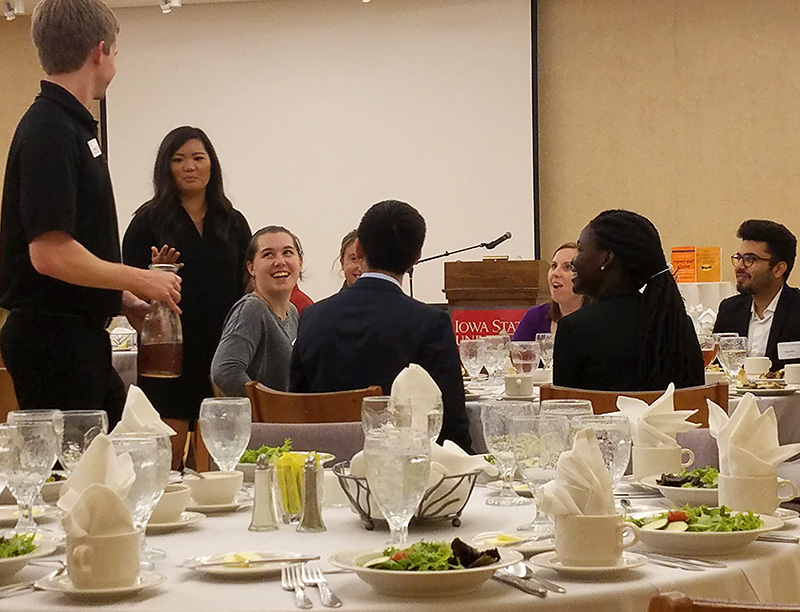
Sukup Manufacturing external relations manager Rachel Geilenfeld (second from left) talks with a table of students and a server during the "Put Your Best Fork Forward: Business Week Netiquette Dinner." Photo by Jeff Budlong.
Despite what Mom may have said, elbows on the table are not necessarily a bad thing.
That was one of many etiquette and networking tips Sukup Manufacturing external relations manager Rachel Geilenfeld shared with about 50 people in the Memorial Union Gallery Tuesday night.
Geilenfeld, an Iowa State alumna, led an interactive discussion as part of the "Put Your Best Fork Forward: Business Week Netiquette Dinner." It was designed to help Iowa State students gain necessary skills when dining in formal settings and provide networking tips to leave the best impression in social situations.
"This is a relevant skill, especially in the business field, because this will be part of your interaction with colleagues within your industry," Geilenfeld said. "This is part of the extra stuff you want to use to make yourself stand out. Etiquette is becoming a standard, and if you don't know, you are putting yourself at a disadvantage."
Getting involved
Business Week, Sept. 16-20, is designed to support students' professional development and provide opportunities to network.
Senior marketing and management major Emily Hammer attended the netiquette event for the second straight year, and said the information helped her at summer conferences.
"It was nice to have that skill set because I was sitting with other people who were in the professional industry," she said. "I knew some of the etiquette things may just set me apart from other people. There are a lot of recruiters or employers who will take you out to lunch or dinner to get to know you, and they are paying attention to your manners and skills."
Hammer said unfamiliar situations can lead to learning. Even as a senior, Hammer still meets new faculty, staff and students, and credits professors for urging students to take their learning outside the classroom.
"The professors here are focused on getting us jobs and getting us into a career," Hammer said. "I have had so many professors who push going to the career fair, going to these events and they understand I am not going to college to go to college. I am here to set myself apart from other students."
Helpful tips
Some of Geilenfeld's tips drew laughs, but she said many people are unaware of common practices that can elevate job seekers in the eyes of prospective employers, including:
- Know your water glass. "The most important thing in the setting is to know your water glass is to your right. At every meal in a banquet setting someone will grab the water to their left ... and pretty soon one person has two waters and one person has no water."
- Nametags. "A nametag is always worn on (your) right side. When you shake hands with someone with your right hand it creates a line of sight to your nametag."
- Watch your elbows. "No elbows on the table only applies to when food is being eaten. If there is no food on the table, you are welcome to lean or put your elbows on the table to help facilitate conversation."
From boxes as bedding to dorm room bins, recycling efforts blossom
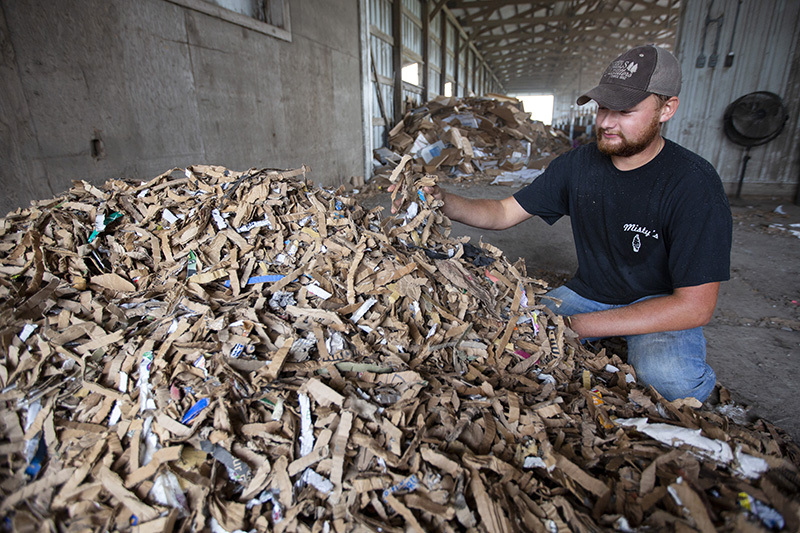
Student employee Tristan Holden with a pile of shredded cardboard being used as cattle pen bedding at Iowa State's Ruminant Nutrition Farm. Photos by Christopher Gannon.
If a waste-reduction pilot project takes off, cardboard recycled at Iowa State could end up back on campus, after a pit stop in a livestock pen.
The initiative to shred cardboard for use at ISU farms as animal bedding -- which is then fodder for the university's compost facility, which supplies material for campus projects and plants -- is one of several efforts launched in the past year as part of Iowa State's goal to become zero-waste by 2025. The projects, many of them trials meant to study what works best, have been headed up by Ayodeji Oluwalana, hired last year as the first full-time ISU recycling coordinator.
"The past year has been laying a foundation upon which the zero-waste efforts will solidify. I know behavioral changes take a while," Oluwalana said.
Here's a look at the recycling improvements in the works:
From boxes to farms
The cardboard-shredding pilot sprang from discussion about the increasingly challenging market for recycled materials, a downturn caused by China's tighter restrictions on imports.
"Because the market has changed, it was a good time to talk about doing something else," said Jayna Grauerholz, a procurement agent involved in the project.
One idea was to find a way to use cardboard, which is collected separately from other recyclables at 63 sites across campus. Three weeks ago, recycling haulers began delivering the disassembled boxes to Iowa State's beef nutrition farm instead of Mid America Recycling in Des Moines, which takes the university's other recycled products.
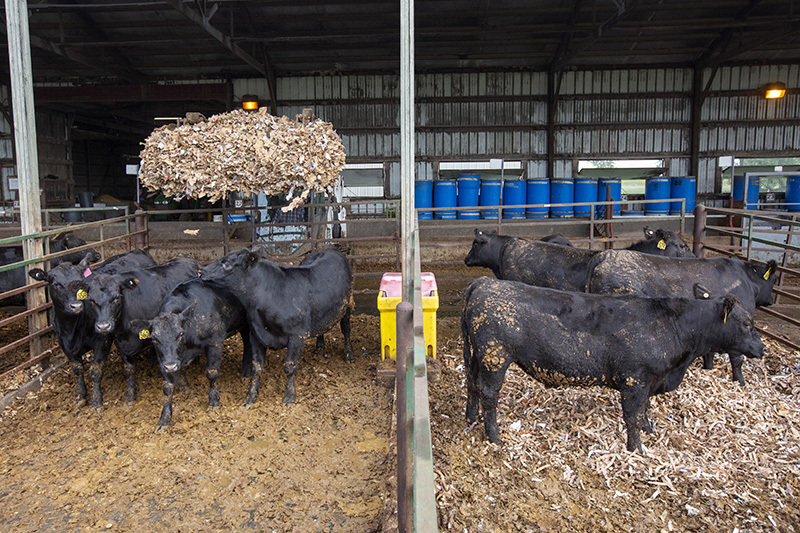
Cardboard is being used as bedding for beef cattle.
Grauerholz said piles of torn cardboard appear to be acceptable bedding, even more absorbent than the corn stalks previously used. But for the plan to work, the soiled cardboard bedding will need to compost well. It's too soon to tell if it will, she said.
"If it's successful, we'll sit down with the stakeholders to determine the costs and benefits," Oluwalana said.
Iowa State would be the first university she's aware of to use its cardboard collections for animal bedding, Grauerholz said. Though it would cut down on transport costs, the financial impact is not the most important factor.
"The main focus is to make the best choices for the environment," she said.
In-room recycling
Beginning this fall, in-room recycling containers are provided for all on-campus student residences, including apartments. Recycling had been available in residence halls at central collection areas on each floor, but usage was spotty, Oluwalana said.
"One year, they might have a student who is passionate about it. Then the next year it would fall through. That model wasn't really engaging students," he said.
After piloting in-room recycling in Maple, Willow, Larch and Linden halls in the spring, the program kicked off this fall. Bins and instructions were provided as part of the check-in process. Students haul their own recycling to their building's single-stream dumpsters.
For more information
A recycling and sustainability forum with a question and answer session will be held Sept. 25 (11 a.m.-noon, MU Campanile Room). Panelists include Oluwalana, sustainability director Merry Rankin, senior Izabel Wilde (sustainability director, Student Government) and graduate student Carissa Moyna (president and compost project leader, Engineers for a Sustainable World).
Oluwalana said further education is needed to ensure students don't toss their recycling out in plastic garbage bags, which can lead to entire truckloads of recycling being rejected and redirected to a landfill. Trash bags and food are the biggest contamination issues, he said. To allow for shredding and use with animals, cardboard also needs to be untainted.
Trash testing
In another test, Oluwalana urged his facilities planning and management (FPM) colleagues in the General Services Building to give up their trash cans last fall, leaving their blue recycling bins as the only at-desk disposal option. Losing the most convenient way to get rid of garbage decreases how much potential recycling ends up in the landfill-bound stream. It also cuts down on waste overall.
"You end up thinking about what you're generating in the first place," he said.
More than 50 FPM workers, roughly one-third of the office staff, agreed to forgo trash for two months. At the start of the trial period, an audit of the building's garbage showed 55% was recyclable. By the end, that was down to 24%. Just three employees asked for their garbage cans back, Oluwalana said.
"People felt like, 'Yes, I can deal with this,'" he said, noting that new signs emphasizing precisely what can go in recycling bins helped. (The signs are available to download.)
Oluwalana hopes to extend similar testing to a handful of academic buildings this spring, adding other variables such as having custodians empty recycling bins from desks instead of trash bins. He plans to implement a new scheme for deskside recycling campuswide next fall.
Tipping the scale
Iowa State's zero-waste goal aims to halt all trash production, though Oluwalana said he would consider the ambition achieved if all plausible efforts keep 85-90% of waste out of landfills. Hitting that mark requires detailed and accurate information about the university's trash and recycling volumes.
"Without data, you can't measure your success," he said.
A new recycling hauler contract began this summer and will help solve the data issue. It requires Waste Management trucks to use dedicated routes for campus recycling, which allows it to provide accurate weights of the material drivers collect because other customers' recycling isn't mixed with the university's.
FPM custodians also are helping by tracking recycling volumes building-by-building, using a cellphone app to record how many 55-gallon bins they're emptying and how full they are, Oluwalana said. With that information, he can address site-specific issues.
About 2,000 tons of ISU garbage ended up landfilled in fiscal year 2019. Extrapolating some trial runs with dedicated recycling routes, Oluwalana estimates that about two-thirds of the total waste generated on campus was diverted from the landfill, including:
- 1,230 tons burned for fuel at the city of Ames Resource Recovery Plant
- 1,850 tons recycled
- 705 tons donated or purchased through ISU Surplus
- 355 tons composted
What's next
Oluwalana aims to expand recycling at campus events, including athletics events. He's recruiting for a zero-waste team to volunteer for awareness activities and event coverage. Students, faculty and staff are welcome to join. Those interested can email him at recycling@iastate.edu. He plans to convene a meeting of volunteers later this semester.
Grants available to develop, expand study abroad opportunities
Iowa State's Council on International Programs encourages faculty and staff to apply for grant funding (up to $6,000) to develop new or substantially expand existing study abroad programs. The goal is to boost the number of Iowa State students who gain an international perspective through study abroad. The council anticipates funding eight to 10 grants this year. Proposals are due Oct. 15, and funds must be used by June 30, 2020.
Grant funds may be used for salaries, student stipends, travel and supplies. They can't be used to purchase equipment or cover expenses normally included in a foreign travel grant. A department or college cost share is required, and the project director must be eligible to be a principal investigator as defined by university guidelines.
Preference will be given to proposals that meet one or both of these criteria:
- Involve faculty who recently are tenured and have the potential to continue to support study abroad in their careers
- Develop or strengthen a relationship with a foreign partner for which there's opportunity to support study abroad and research
The current CIP call for proposals, including grant criteria and application instructions, is online. Proposals should be submitted via email to Penni Bryant, pabryant@iastate.edu, in the provost's office by Oct. 15. Award notifications will be made around Nov. 15 and funds will be available immediately.
Questions may be directed to associate provost for academic programs Ann Marie VanDerZanden.
Website memorializes students who die during their campus years
Remembering Iowa State students who have died and honoring their accomplishments is the aim of a website the office of student assistance and division of student affairs launched this summer. As of July 1, Cyclones Forever will serve as a memorial to enrolled students at the time of their death. Find the website via student assistance's grief and loss resource page or the division of student affairs homepage.
As often occurs on a large campus, the website project emerged from several concepts that were simmering serendipitously, said Megan Van Heiden, senior assistant director in student assistance, the front line office in responding to a student death. The September 2018 murder of Cyclone student-athlete Celia Barquin Arozamena had a far-reaching and punch-packing effect on the broader Ames community. Van Heiden was participating in the student affairs division's leadership institute last year at the same time a team from the 2018-19 Emerging Leaders Academy was looking for a meaningful, helpful capstone project. The two merged their efforts to develop the website.
"We knew we needed a place for people to go for support in navigating their grief," Van Heiden said. "Losing a student is impactful on a campus community."
How it works
When an Iowa State student dies, Van Heiden said staff in her office will post the student's name, college, major and attendance dates on the Cyclones Forever website. As part of their contact with a deceased student's family, staff will invite them to add a photo, memories or other information -- such as a link to a published obituary -- to the website. Families aren't required to do anything with the request, she noted. When they do, the student's name on Cyclones Forever becomes a link to additional information; the flower graphic can be replaced with a photograph. Van Heiden said only family members will be allowed to add information to a student site.
Resources for faculty, staff
The Cyclones Forever website includes resource pages for students and for families grieving a loss. It also links to a resource page for faculty and staff on the senior vice president and provost's website. That page addresses topics such as the university's notification process when a student dies, student absences from class and campus resources for students and employees. It even includes suggestions and tips for talking to a classroom of students about a student tragedy.
Van Heiden invites faculty and staff to contact the office of student assistance for additional assistance in supporting students who are grieving.
"While we never feel quite comfortable talking about death, especially the death of a young person, we'd like to help staff and faculty feel more comfortable navigating a difficult topic," she said.
'HERoic' season on tap for ISU Theatre
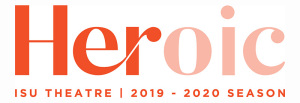
For its 2019-20 season, ISU Theatre will produce six shows written by women, bring two female 2019 Tony Award winners to Iowa State, host a yearlong symposium series on gender in the arts, celebrate the 100th anniversary of women's suffrage and commit to a national "50/50 by 2020" initiative promoting gender equity in theater. It's what you might call a "HERoic" undertaking.
According to the Dramatists Guild of America's 2016-17 season count, only 29% of plays produced in America are written by women. The percentage drops to 24% for plays produced in Iowa's Great Plains region.
ISU Theatre will address the gender gap with a "HERoic" season that features plays and musicals written by women.
"It's time for a change," said Brad Dell, associate professor and ISU Theatre director. "We are eager to commit to gender parity and a more inclusive canon in future seasons. Our season will celebrate the importance of women's voices in the arts, humanities and sciences, and encourage others to commit to equal and equitable space at every table for women now and into the future."
ISU Theatre's season includes a community-focused series of climate change plays, a fun-filled family musical about George Washington, a poetic and contemporary retelling of Homer's "The Odyssey" through an immigrant perspective, the spirited story of a high school girls soccer team, Dolly Parton's high-octane "9 to 5" musical and a puppetry drama that ponders the enormity of the connection between humans and the natural world.
"There is a magic that happens when you bring more diverse voices to the table," Dell said. "This is a season of big questions, soulful storytelling, hilarious comedy and powerful possibilities."
Tony Award winners
ISU Theatre also planned a yearlong symposium series, "HERoic: Gender Equity in the Arts," which includes lectures by two 2019 Tony Award recipients.
Rachel Hauck, 2019 winner for best scenic design of a musical for "Hadestown," will present "Knowing How to Break the Rules: Set Design on Broadway" Oct. 6 (7 p.m., Memorial Union Great Hall).
Ali Stroker, the first actor in a wheelchair to earn a 2019 Tony Award, was selected as the best supporting actress in a musical for "Oklahoma." Stroker will present "Turning Limitations into Opportunities" on April 6, 2020 (7 p.m., MU Great Hall).
The symposium series will include roundtable community conversations after the Sunday matinees of each ISU Theatre production. These conversations will feature local experts and guest artists who will lead discussions relating to the productions, gender equity, representation and diversity.
"We are excited to invite audiences to participate in this conversation and provide students opportunities to engage with local, regional and national artists and scholars," Dell said.
Dell hopes this year of programming is just the start. ISU Theatre already is looking toward its 2020-21 season with plans to participate in the national theater community's "Year of Jubilee," a celebration that envisions every American theater producing works by women, people of color, artists of varied physical and cognitive ability and LGBTQIA-identified artists.
Guest artists
New York-based director Arpita Mukherjee will be one of the College of Liberal Arts and Sciences Dean's Artists in Residence. A Eugene O'Neill Directing Fellow and member of the Lincoln Center Director's Lab, Mukherjee will offer a series of guest artist masterclasses and direct ISU Theatre's production of "Anon(ymous)."
Five recent alumnae will return as guest artists to direct and design the "HERoic" season.
2019-20 "HERoic" season
All performances will be held in Fisher Theater. Season and single-show tickets are available through the Stephens Auditorium ticket office and Ticketmaster, or the Fisher Theater box office one hour prior to performances.
Climate Change Theatre Action: Lighting the Way
Oct. 4-13
Short plays address climate change issues and present a call to community action in partnership with the international Climate Change Theatre Action initiative.
"Chasing George Washington: A White House Adventure"
Oct. 25-Nov. 2
A White House field trip turns into a magical adventure with our most famous founding father, who helps students discover the true portrait of America.
"Anon(ymous)"
Dec. 6-14
A young refugee travels the U.S. on a search for his family in an imaginative adaptation of Homer's "The Odyssey."
"The Wolves"
Feb. 28-March 7
From the safety of their warm-up circle, an all-girls soccer team navigates the big questions and wages tiny battles with all the vim and vigor of a pack of adolescent warriors.
"9 to 5"
April 3-11
Based on the hit 1980 film, "9 to 5" delivers musical comedy and feminist flair when a trio of overworked office workers kidnap their sexist, egotistical, lying, hypocritical bigot of a boss.
"Of the Deep"
April 24-May 2
In this new play featuring puppetry and original music, residents of a small coastal village discover a massive whale carcass on their shore and must confront practical and existential challenges.
